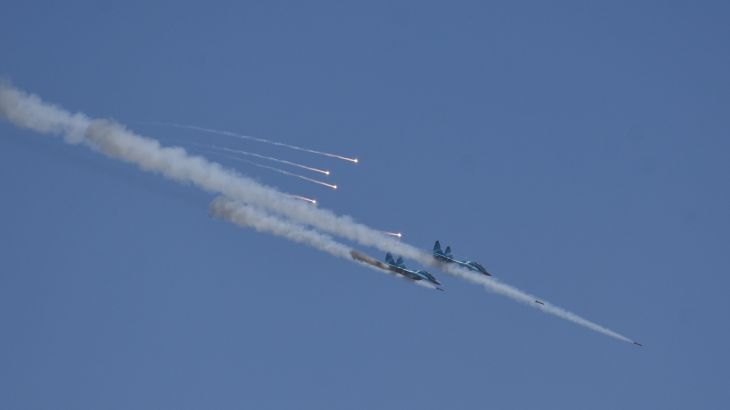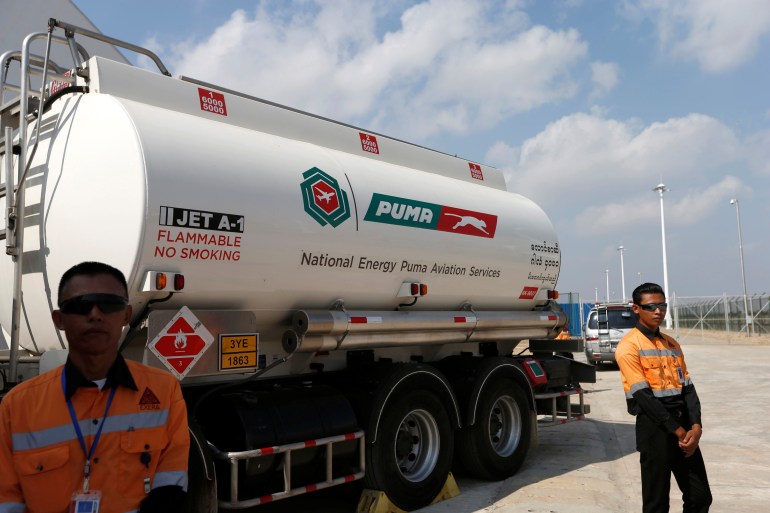Myanmar military gets new aviation fuel supplies despite abuses
New report from Amnesty Intl, Global Witness and Burma Campaign UK reveals new shipments of fuel despite hundreds of air attacks last year.

The Myanmar military continues to secure supplies of aviation fuel — involving companies from Asia and Europe — despite air raids that have killed and maimed civilians and forced thousands from their homes, according to a new report.
Amnesty International, Global Witness and advocacy group Burma Campaign UK said on Wednesday they had identified more companies involved in aviation fuel transactions, following up on an investigation into the aviation fuel supply chain last year that found supplies for civilian aviation were being diverted to the military.
Keep reading
list of 4 itemsQ&A: The opium surge in Southeast Asia’s ‘Golden Triangle’
Alarm grows over WFP plan to cut food aid for Rohingya refugees
Myanmar’s military regime to let ‘loyal’ citizens carry weapons
“We have traced new shipments of aviation fuel that have likely ended up in the hands of Myanmar’s military, which has consistently conducted unlawful air strikes,” Montse Ferrer, Amnesty International’s researcher and adviser on business and human rights, said in a statement.
“Since the military’s coup in 2021, it has brutally suppressed its critics and attacked civilians from the ground and the air. Supplies of aviation fuel reaching the military enable these war crimes. These shipments must stop now.”
Army chief Min Aung Hlaing seized power from Myanmar’s elected government just over two years ago, sparking mass protests that have evolved into armed resistance amid a brutal military crackdown.
The United Nations says the military carried out at least 670 air attacks last year, 12 times more than the 54 recorded the year before. The UN says some of the attacks — including a raid on a school in the northern central Sagaing region last September that killed at least 11 children — amount to war crimes.
“We urge anyone involved in this trade to put people before profits and to cease supplying the fuel that facilitates these atrocities,” Hanna Hindstrom, senior investigator at Global Witness, which helped conduct the research, said in a statement. “We call on more states to enact or reinforce controls to prevent these supplies.”
Shippers to insurers
The latest report found that the oil tanker Prime V, which sailed from the Indian port of Sikka on November 22, offloaded Jet A-1 grade aviation fuel at the former Puma Energy Aviation Sun (PEAS) terminal in Myanmar’s Thilawa port about three weeks later.
Companies involved in the transaction included India’s Reliance Industries, which owns the Sikka terminal, Sea Trade Marine, the Greek company that is the beneficial owner of Prime V, and Japan’s P&I Club, which provided the protection and indemnity (P&I) insurance.
Amnesty said it contacted the companies, but only Japan P&I Club responded, saying that it complied with applicable sanctions at the time and that its insurance cover may be terminated if a vessel is involved in illegal activity. There is no suggestion that the Prime V broke applicable laws in this delivery.
The report also obtained evidence of an October shipment involving the tanker Big Sea 104, which left Bangkok Port’s Bangchak Oil Refinery on or about October 8, arriving at Thilawa about a week later. It offloaded 12,592 tonnes of Jet A-1, according to data from Kpler, a commodities information company, at the former PEAS terminal, Amnesty said.
The Bangchak refinery is owned by the publicly-listed Thai company Bangchak Corporation. Prima Marine, another Thai company, is the beneficial owner of Big Sea 104, while Luxembourg-based The Shipowners’ P&I Club provided the insurance. None of these companies responded to Amnesty International’s letters about the shipment, the rights group said.
The report also raised questions about the sale of the Myanmar assets of Swiss and Singapore-based Puma Energy.
Puma Energy announced last October it was withdrawing from Myanmar after selling its assets to a “locally owned private company”. It said it had secured undertakings from the buyer to comply with “Human Rights laws” and not use assets to commit human rights violations.
Amnesty said the transaction was completed in December last year and that the buyer of the assets was Shoon Energy, previously known as Asia Sun Aviation.
Shoon Energy is part of the Myanmar business conglomerate Asia Sun, which imported aviation fuel on behalf of the military and then distributed it to air bases. With the departure of Puma Energy, this conglomerate now manages the main aviation fuel terminal in Thilawa port, and, jointly with military-controlled Myanmar Petroleum Products Enterprise, the import and distribution of aviation fuel across the country.
Individuals behind the Asia Sun group and its associated firms were sanctioned by the United Kingdom and European Union over their links to the supply of aviation fuel to the Myanmar air force.
But Amnesty noted that before the sanctions were imposed, some of the names of the companies in the group were changed to Shoon Energy.
“Puma Energy has stated that the buyer of its Myanmar assets has undertaken to ‘comply with Human Rights law’. However, given the close relationship between Shoon Energy and the Myanmar military we are concerned this assurance is essentially meaningless,” Ferrer said.

After the November report, some of the companies identified took action to curb activities linked to the supply of aviation fuel to Myanmar.
Amnesty and Global Witness reiterated their call for countries to suspend the export and transport of aviation fuel to Myanmar, and suspend the provision of third-party services such as insurance, shipping or financial services to vessels involved in the shipment of aviation fuel to Myanmar.
“The international community has the tools in place to enact these restrictions. We should do what is in our power to reduce the Myanmar military’s capacity for terrorizing civilians,” Hindstrom said.